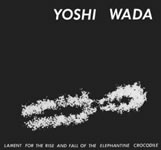|
|
 |
Dusted Reviews
Artist: Yoshi Wada Album: Lament For The Rise and Fall of Elephantine Crocodile Label: EM Review date: Feb. 21, 2008 |

|
|
|
 |
Japanese sculptor and sound artist Yoshi Wada was a key figure in New York’s Fluxus movement in the late 1960s and ’70s. And yet, though he performed and collaborated with a number of Fluxus bigwigs (most notably composer and Dream Syndicate leader La Monte Young), he released only a pair of wonderful recordings, both as tantalizingly rare as hen's teeth. The harder to find of the two releases – and also the more celebrated – is Lament for the Rise and Fall of the Elephantine Crocodile, a record originally released on the India Navigation label in 1982 and which quickly achieved a holy grail status among drone aficionados and collectors of all things Fluxus.
The fact that Japan's EM Records has at long last made this classic album available for the first time on CD is cause for celebration. An enjoyably unpredictable and idiosyncratic imprint known for reissuing both avant-garde classics and wonderfully cheesy albums of singing saw virtuosos, EM gives the record the deluxe treatment, providing extensive liner notes, copious documentation, and rare photographs. More importantly, the folks at EM got hold of the original tapes, which they have digitally remastered and restored to their original, unedited lengths (the LP versions were both edited down and had less than ideal fidelity).
The album was recorded on November 29, 1981, at a venue called "Dry Pool" in Buffalo, NY, which, as its name suggests, was an empty swimming pool with unusually reverberant acoustics. As he prepared for the recording, Wada lived and slept in the space before recording a two-part, improvisatory piece. The first part, "Singing," features Wada's powerful chanting (he studied with the Indian vocal master, Pandit Pran Nath), his deep, ragged baritone soaring and drifting as he explores the sonic particularities of the space. In his liner notes to the original LP, Wada wrote that he felt, at times, the room itself seemed to drone, contributing to the overall hallucinatory quality of the music. And it is thoroughly mesmerizing.
With the arrival of “The Elephantine Crocodile” and its cousin “The Alligator” in part two of the disc, things get more intense and engrossing still. The aforementioned animals are two reed instruments, designed and built by Wada and played bagpipe-style, using bellows. As engrossing as the solo voice work is, it's this second piece, titled "Bagpipe," that is the true and utter mind-bender. The thick, swirling haze of overtones that Wada generates with his strange instruments – created from plumbing pipes, an air compressor, and other hardware – is spellbindingly complex. This is one record that thoroughly deserves its reputation as a classic.
By Susanna Bolle
|







